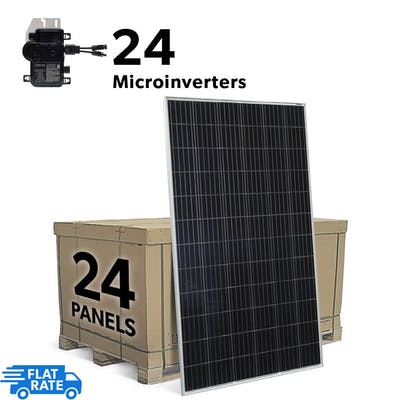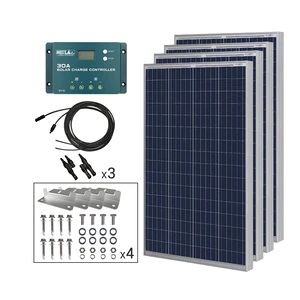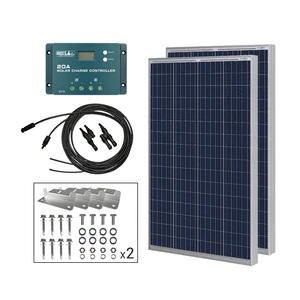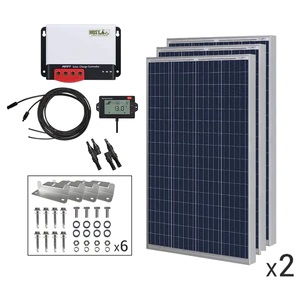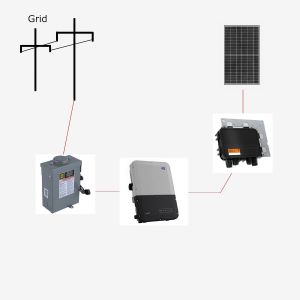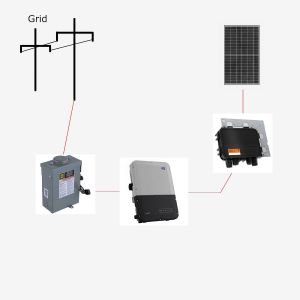Solar panels for sale: comparing websites offering solar systems for sale
Written by Andrew Sendy
Updated August 12, 2021
5 minutes read
Categories: Solar 101, Solar panels, Solar power, DIY solar
Homeowners looking to install a solar panel system on their roof to save on electricity bills face a choice. They can either go with a full-service solar company who will supply and install the equipment, or buy solar panels for sale from a solar panel kits website (or hardware store) and arrange the installation themselves.
This article helps those considering a DIY solar power project by showing you the best places to find solar panels for sale. It allows you to search for solar panel kits by brand, website and system size. It also shows you how to compare the solar panel kits offered by each of these websites on an apples-for-apples basis, as each solar kits website offers a different package of services around their kits.
| System Size (kW) | Panel | Inverter | Price | Cost Per Watt | Website | |
|---|---|---|---|---|---|---|
| 87.69 |
24 x
CHSM6612M 365
|
24 x
IQ7A-72-2-US
|
$13,556.85 | $0.15 | wholesalesolar.com | |
| 0.40 | $349.99 | $0.87 | hqsolarpower.com | |||
| 0.20 | $179.99 | $0.90 | hqsolarpower.com |
[For those wanting to compare prices from full-service solar providers — the option chosen by around 93% of American homeowners — use this solar estimator tool to get a ballpark idea of the solar system size you need and compare prices from solar providers near you on these fully installed turnkey systems].
How much can you save by buying a solar panel kit online?
A simple web search for Canadian Solar panels, a common brand of residential solar panel, shows you can buy a complete kit containing 300 watt Canadian Solar panels and an SMA inverter for $8,100, or $1.35 per watt.
However, a quote from a full-service solar company for a fully-installed system with the same equipment, city and utility permitting and inspections will most likely be around $3.00 per watt.
The average residential solar system installed is about 6 kW (6000 watts).
The DIY Canadian Solar panel kit above that cost $8,100, is $18,000 as a fully installed package ($3.00 per watt installed). This is a price difference of almost $10,000 (or approximately $7,400 after the federal solar tax credit).
With such a huge price difference it’s no wonder homeowners begin to consider how much they’ll save if they buy solar panels for sale online and contract someone to do the installation.
How much will the installation cost if you buy a solar panel system online as a kit?
In most states, you need a qualified installer to install a solar panel system. These people will charge you based on the size of the system the difficulty of the installation and whether they are going to handle the required utility and city permitting and inspections for you.
Solar installers will usually charge one-off residential customers between $0.80 per watt and $1.00 per watt making the installation cost for a 6 kW system anywhere from $4,800 to $6,000.
If you are considering buying a solar panel kit then we have reviewed each of the leading solar kit websites below. But before you buy any kit we recommend you read up on the pros and cons of doing a DIY solar project.
Before you start your DIY project, you should get at least one (but preferably two) quotes from a full-service company. You can do that online through our solar panels estimator. I suggest this so that you have some knowledge as to how much this option will cost you in comparison to a DIY project once ALL costs have been factored in: panels, inverters, racking, electrical sundries, service board upgrades, installation labor, permitting and inspections. You will then have a true indication of much money you can potentially save, and whether it's worth your time and effort.
Find out the cost of installing solar panels on your roof

A DIY solar project is a huge undertaking and not to be taken lightly. You are completely on your own for the next 25 years should there ever be any warranty or performance issues with your system. The only reason you should ever consider a DIY solar project is if you have done your homework and know for certain you can save yourself money without compromising the quality of the system.
I recently spoke to a senior executive at one of the biggest solar panel kit websites, and surprisingly even he agreed that for the vast majority of people a DIY solar project isn’t a great idea. But if you’re interested in learning more about the cost and processes associated with DIY solar panel installation, additional information can be found at SolarReviews.
What should I look for on websites that sell solar panel kits?
Before you start going through our list of top solar panel kits websites, let's take a minute to talk about some of the different criteria you should look for when making your decision.
Product options
The type of home solar kit you buy should be your first consideration. Unfortunately, not all solar kits are the same. You will find that not every solar kit comes with the same products, which makes it much harder when you are trying to find the best price because you are not comparing apples with apples.
You may also find that because they are targeting very price-sensitive customers, rather than offering high-quality systems many offer lower-quality solar brands that don’t have high efficiency. This keeps prices down, but isn’t always the best solution long term.
You will also find there is also a variance from website to website in what actually comes in a kit. Some solar kits come only with panels and inverters. Some add racking devices. Meanwhile, some include all the above along with minor electrical items (like circuit breakers) to offer a more complete solar solution. Before you jump online and order anything you will need to work out what you will need to complete the installation job. I also recommend speaking to the installer you are using to ask what he or she will need you to provide in terms of equipment.
Service packages
What will you be looking for in a website? Someone who simply sells solar kits with no other extra services, or someone who can help you with system design and permitting? Some websites are only interested in selling you a solar power system and aren't interested in anything else involved with the installation; these are usually the cheapest websites offering the lowest prices.
Other sites offer more services. such as advice in terms of design and permitting documentation. These websites can be a little more expensive, but they can also make the DIY job easier to pull off.
Expertise
Before laying your hard-earned money down on a solar kit, you need to go over your plans and designs to make sure the system you are buying is going to meet all your requirements.
Firstly, you need to make sure the system you are buying fits on your roof, and the output of the solar panels need to be in the acceptable range for the utility to grant you a net metering agreement. Although rules vary from state to state most utilities only allow net metering of a system that will produce around 110% of your solar electricity consumption.
You also need to understand what type of solar package you are buying. Off-grid and grid-tie solar packages, for example, are completely different. And will you be adding a solar battery? You need to be clear about what you want. These issues may be hard to consider on your own, and many contracted solar installers will only work with grid systems they’re familiar with.
Which of the websites offering solar panels for sale is the best?
| System Size (kW) | Panel | Inverter | Price | Cost Per Watt | Website | |
|---|---|---|---|---|---|---|
| 87.69 |
24 x
CHSM6612M 365
|
24 x
IQ7A-72-2-US
|
$13,556.85 | $0.15 | wholesalesolar.com | |
| 0.40 | $349.99 | $0.87 | hqsolarpower.com | |||
| 0.20 | $179.99 | $0.90 | hqsolarpower.com | |||
| 0.60 | $542.99 | $0.90 | hqsolarpower.com | |||
| 9.60 |
30 x
REC-320-NP BLACK
|
$8,914.20 | $0.93 | solar-electric.com | ||
| 8.32 |
26 x
REC-320-NP BLACK
|
$7,826.32 | $0.94 | solar-electric.com |
Can a different solar company install my store-bought solar panel kit?
This would be one of your best options, especially for those who want the benefit of a solar upgrade without the cost of a full installation.
Though solar panels are becoming more user-friendly, their installation and integration still require a level of technical know-how that most people don't have.
Solar panels must be mounted and secured to your roof, carefully positioned so the solar cells capture the maximum amount of sunlight, and correctly integrated into your home’s electrical system. This is why we always recommend that you work with a qualified installer so that you can receive the full value of your solar investment
How much money can I save with a DIY solar system kit compared to a full solar installation?
The obvious reason people look at a DIY solar installation is cost savings. You can purchase a complete solar kit for around $1.35 per watt. When you compare this to the average price of a fully-installed solar system by a qualified solar installer (around $3.00 per watt), this seems to be a great deal. With the average solar install being a 6 kW system, this can mean a savings of around $7000 after federal tax credits (although it will be less with a small solar panel kit).
This is a great saving if you’re a handy DIY person with some experience with these types of installations. Unfortunately, not many people fall into this category and will need to hire a contractor to do the installation. Contractors generally charge anywhere from $4800 to $6000 per installation, which eats up the lion's share of your savings. However, because most homeowners lack the expertise to correctly install solar panels, hiring a professional to do the job correctly is worth it long term. For more information check out our breakdown of solar panel costs here.
Choosing a solar panel kit provider
To summarize, your solar panel kit provider should meet three specific criteria:
- Industry expertise
- Product variety
- Service selection and support
The above entries are some of the best providers we’ve seen, but in truth, there are plenty of great solar panel kit retailers out there. Use this guide as a resource when researching your options and don’t be afraid to reach out for more information if you have questions.
Additional Resources
- National Council of Solar Growth – DIY Home Solar: Should You or Shouldn’t You
- Mr Money Mustache – DIY Solar Power Setup
